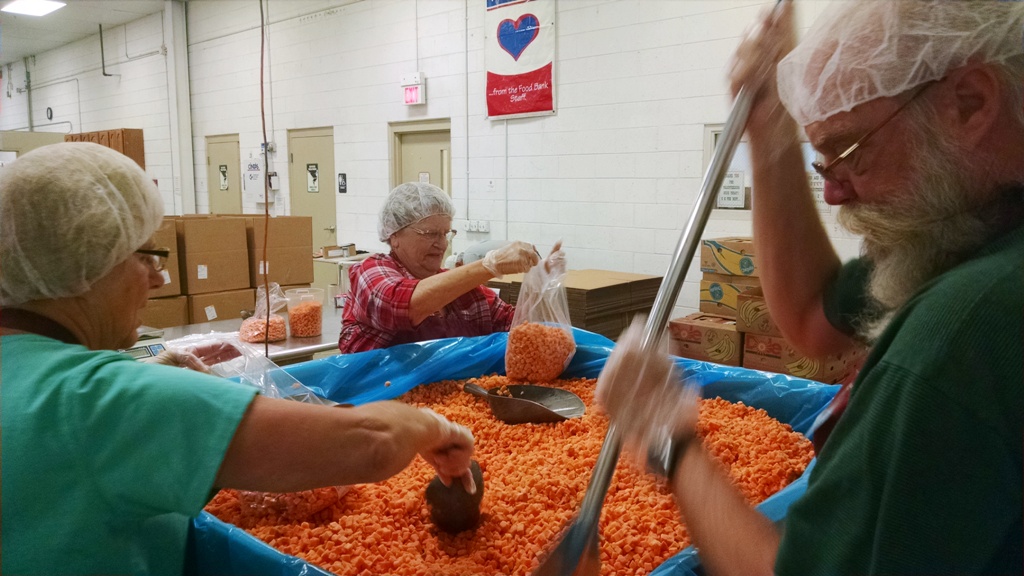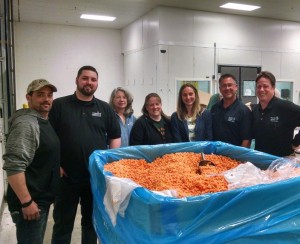
State of Michigan Press Release
Flint, Mich. — April 21, 2016 — Providing healthy food for Michigan residents and helping to reduce food waste is the goal of the quarter of a million dollars in Community Pollution Prevention grants announced today by the Michigan Department of Environmental Quality.
“The right partnerships and planning can turn food that would have been wasted into healthy meals,” said DEQ Director Keith Creagh. “The DEQ is proud to award grants to these organizations so they can provide nutritious food for people in Flint and across Michigan.”
One of the grant winners, Feeding America West Michigan, will partner with the Food Bank of Eastern Michigan and Arbre Farms of Walkerville to provide and distribute up to 2 million pounds of frozen vegetables per year to families in need. Because the vegetables contain high levels of nutrients beneficial to those who have been exposed to lead, half of the vegetables will be sent to the Food Bank of Eastern Michigan, based in Flint.

The DEQ is awarding $100,000 to Feeding America West Michigan to cover start-up costs associated with the frozen vegetable “rescue” program. Currently, according to strict manufacturing guidelines, vegetables that are too big or small, the wrong color or shape — but are still safe and healthy to eat — are disposed of. As part of this project, these vegetables will be “rescued” by being frozen, packaged and distributed by the two food banks to people in need across 62 Michigan counties.
The FDA recommends that adults eat at least four and a half cups of fruits and vegetables every day. There are populations of people across Michigan that have unreliable access to or difficulty obtaining even small amounts of these healthy foods. That’s where the DEQ’s grants that total $241,800 come in.
“Our goal is to provide safe, healthy food to people in Michigan,” said Ken Estelle, CEO of Feeding America West Michigan. “This project will provide nutrient-dense vegetables to almost 1 million people across the state and could be expanded to other fruit and vegetable producers and processors in Michigan.”
Feeding America West Michigan is a food bank located in Comstock Park which serves families in 40 counties in West Michigan and the Upper Peninsula. Last year, it distributed almost 28 million pounds of food — equivalent to 22 million meals — to nearly 500,000 people. Feeding America West Michigan is partnering with Food Bank of Eastern Michigan to distribute vegetables to Flint residents.
“This project will be a powerful tool in addressing the effects of lead exposure by Flint residents,” said William Kerr, President and CEO of the Food Bank of Eastern Michigan. The Food Bank of Eastern Michigan has served as the primary hub for the donation and distribution of water to Flint residents during the water crisis and provides over 25 million pounds of food each year to residents in 22 counties.
“These vegetables will be distributed through the mobile nutrition pantries, which have been set up in partnership with the Michigan Department of Health and Human Services,” said Kerr. The nutrition pantries are being paid for in part by a $28 million appropriations bill passed by state lawmakers and signed by Gov. Rick Snyder in January.
“Carrots, peas, squash and other vegetables from our farms will provide beneficial nutrition to children and families,” said Dylan Marks, President of Abre Farms. Foods rich in calcium, vitamin C and iron allow the body to fight lead absorption, and foods high in vitamin C also help increase the amount of iron in the blood. The vegetables that will be distributed have high amounts of these nutrients.
Arbre Farms, located in Walkerville, produces more than 15 locally grown vegetables and fruits for sale to food manufacturers and distributors. It produces 50,000 tons of finished product annually and uses state-of-the-art manufacturing and distribution infrastructure.
Over $300,000 has been raised locally to support the grant. Feeding America West Michigan will also host a food sourcing and operations conference and present the project as a model program for other food banks and producers.
DEQ’s Community Pollution Prevention Grant Program seeks to bring local government, businesses, planning agencies, and residents together to achieve measurable waste reductions using innovative sustainable practices. Grants are awarded to projects that will reduce waste at the source, feed people or animals, or can be used for industrial or composting purposes. The grant funds come from interest on unclaimed bottle deposits and settlements from environmental cases.
Other organizations receiving 2016 grant awards include:
• Delta Institute was granted $91,150 for a public-private partnership between the City of Lansing, Hammond Farms Landscape Supply, and Live Green Lansing to compost food scraps from local restaurants.
• Wayne County Airport Authority was granted $45,650 to rescue food from airport concessionaires and deliver via Bradford Logistics to Gleaners Community Food Bank for distribution in the Metro Detroit area.
• Love INC Tri-Cities was granted $5,000 to distribute food collected from restaurants, growers and grocers to local community members in need.
To learn more about the Community Pollution Prevention Grants Program, call the DEQ’s Environmental Assistance Center at 800-662-9278 or visit michigan.gov/deqp2grants.
The Michigan Department of Environmental Quality promotes wise management of Michigan’s air, land, and water resources to support a sustainable environment, healthy communities, and vibrant economy. Learn more at michigan.gov/deq.
For more information:
Debra Swartz, 517-284-6903, swartzd@michigan.gov
Mel Brown, 517-284-6713
